Life After Idol
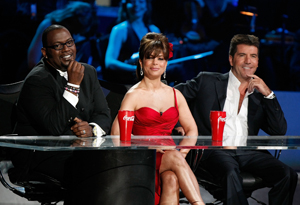
Photo: Getty
Simon Cowell is perhaps the world's most famous talent scout. He's had a hand in the careers of superstars like American Idol Carrie Underwood, Britain's X Factor breakout Leona Lewis and Britain's Got Talent megastar Susan Boyle. Simon's been sitting at the American Idol judges table since the very first show and has been credited largely with the series' runaway success. But now, after nine seasons, Simon is leaving Idol to produce and judge the U.S. version of The X Factor. "Two years ago, I remember sitting in the auditions one day and I thought, 'I think this is about as far as we can go,'" he says. "I've always promised myself that I'd leave before I was forced to go."
Simon's departure comes on the heels of a ratings dip for Idol—a decline of 8 percent—which Simon believes was due to a combination of factors, including former judge Paula Abdul's departure . "We had a great team. The show's a different show," he says. "She's a survivor, Paula. She's got great instincts, so for whatever reason she decided not to go back, she'll come back on top. I'm absolutely convinced of that."
Simon's departure comes on the heels of a ratings dip for Idol—a decline of 8 percent—which Simon believes was due to a combination of factors, including former judge Paula Abdul's departure . "We had a great team. The show's a different show," he says. "She's a survivor, Paula. She's got great instincts, so for whatever reason she decided not to go back, she'll come back on top. I'm absolutely convinced of that."
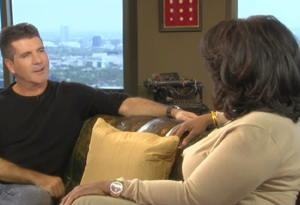
As soon as Simon announced he was leaving, the question on everyone's mind was the same: Who will replace him? Simon says it's not about picking someone with a certain personality but a certain eye. "You've got to have somebody on that panel who actually knows what they're talking about. Everyone's talking about casting a nasty person or getting another Brit," he says. "If we were judging the ice skating Olympics, you wouldn't have somebody on who's obnoxious, you'd have somebody who knows the difference between a 10, a 9 and an 8. I think, to a point, you kind of have to go back to that."
The most important thing Simon brought to the show, he says, is his ability to spot a potential star, but what he's best know for is his no-hold-barred critiques. "I just couldn't take it seriously when these awful people were coming in and they sing horrifically," he says. "It has its ups and downs. There were many, many times when I've watched the show back, because [we] don't hear the backstory. We don't really know what's going on outside the room, and you hear a story about 'The cat died minutes ago and I'm singing this song for my cat.' I don't know that and when I watch it back and I'm being vile to them I think: 'God, I wish I hadn't said that. If only I had known about the cat.'"
Ultimately, though, Simon says his blunt criticism is actually meant to help the contestants. "It does frustrate me when you get these young kids come in who are absolutely terrible and they've been told all their lives by the mom, dad, family that 'You're going to have a career in show business.' That's when I actually think I'm doing some good, which is to say to them: 'I promise you, you're not going to do what you want to do. It just won't happen, so just stop. It's a fantasy. Get on with something in your life you're going to be successful at,'" he says. "I've given them what has helped me in my life, which is I never, ever got anywhere by people patronizing me. Even today, when I screw up, people around me will say, 'Simon, you've got this completely wrong.' And I listen to them."
The most important thing Simon brought to the show, he says, is his ability to spot a potential star, but what he's best know for is his no-hold-barred critiques. "I just couldn't take it seriously when these awful people were coming in and they sing horrifically," he says. "It has its ups and downs. There were many, many times when I've watched the show back, because [we] don't hear the backstory. We don't really know what's going on outside the room, and you hear a story about 'The cat died minutes ago and I'm singing this song for my cat.' I don't know that and when I watch it back and I'm being vile to them I think: 'God, I wish I hadn't said that. If only I had known about the cat.'"
Ultimately, though, Simon says his blunt criticism is actually meant to help the contestants. "It does frustrate me when you get these young kids come in who are absolutely terrible and they've been told all their lives by the mom, dad, family that 'You're going to have a career in show business.' That's when I actually think I'm doing some good, which is to say to them: 'I promise you, you're not going to do what you want to do. It just won't happen, so just stop. It's a fantasy. Get on with something in your life you're going to be successful at,'" he says. "I've given them what has helped me in my life, which is I never, ever got anywhere by people patronizing me. Even today, when I screw up, people around me will say, 'Simon, you've got this completely wrong.' And I listen to them."
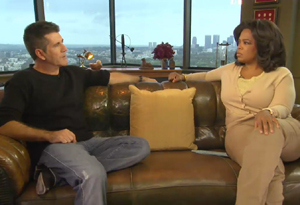
Though his rise to fame since American Idol has seemed meteoric, Simon says he suffered terrible failures before hitting it big. "I made some absolutely horrific mistakes. I believed my own ego, believed my own hype, believed my own abilities, and lots of times it came crashing down," he says. "I thought I was absolutely untouchable. But it was rather like what the world went through two years ago. It was all borrowed. It was all nothing. And sure enough, the whole lot came crashing down. Which meant at the age of 30, I went to live with my mom and dad and had to sell the house, the Porsche—everything went. I had literally nothing other than about a half-million-dollar loan I had to repay."
But this failure served as a wake-up call, Simon says. "Once everything was gone, there was nothing I missed, and all the pressure went away. Then it kind of became reality, which was, I've literally got to start again with nothing." It took three or four years to pay back loans, Simon says, and then he started over. "In a weird way, it was one of the happiest times of my life."
Even when he had the Porsche and the fancy house, Simon says he never could have imagined the level of success he's reached today. "I do sometimes think, which is probably what still drives me—even though the memory of when I lost everything isn't a painful memory now, it's still a reality—many, many times I do actually think, 'Maybe the whole lot will come crashing down,'" he says.
But this failure served as a wake-up call, Simon says. "Once everything was gone, there was nothing I missed, and all the pressure went away. Then it kind of became reality, which was, I've literally got to start again with nothing." It took three or four years to pay back loans, Simon says, and then he started over. "In a weird way, it was one of the happiest times of my life."
Even when he had the Porsche and the fancy house, Simon says he never could have imagined the level of success he's reached today. "I do sometimes think, which is probably what still drives me—even though the memory of when I lost everything isn't a painful memory now, it's still a reality—many, many times I do actually think, 'Maybe the whole lot will come crashing down,'" he says.
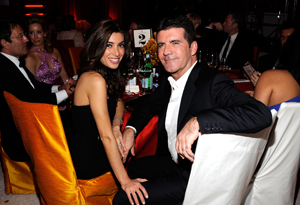
Photo: Getty
American Idol viewers might say that Simon is arrogant or out of control, but those who know him often describe him as warm and generous. So who's the real Simon Cowell? "A combination of the two," he says. "Of course I have an ego, but you have to have an ego. You have to be incredibly competitive. I can get competitive at times, way too much, and it becomes a little bit obsessive."
These days, Simon is dating Mezhgan Hussainy, American Idol's lead makeup artist, but says that at 50 years old, he's not sure he wants kids. "When I was younger, my dad used to play soccer and games with me and I worry, if I were 70...that worries me a little bit," he says. "If they could be born at the age of 5, I'd quite like them at that age. I like them when they can talk and understand. ... I'm not sure I could deal with the whole gaga, googoo. But I do like kids when I can talk to them. I mean, genuinely like them."
These days, Simon is dating Mezhgan Hussainy, American Idol's lead makeup artist, but says that at 50 years old, he's not sure he wants kids. "When I was younger, my dad used to play soccer and games with me and I worry, if I were 70...that worries me a little bit," he says. "If they could be born at the age of 5, I'd quite like them at that age. I like them when they can talk and understand. ... I'm not sure I could deal with the whole gaga, googoo. But I do like kids when I can talk to them. I mean, genuinely like them."
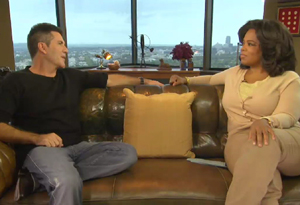
Simon says that his moods in general tend to change throughout the year. "I get very, very down," he says. "Pretty much depression. [But] what I always say is, 'You're taking yourself too seriously, so stop it.' At the same time, you should never put a painted smile on. When you're feeling down, you're feeling down."
Simon says these low moments might be a result of all the people who rely on him. "You can go through days where by the end of it, you feel that everything's been sucked out of you because of that dependency," he says. "You just become aware that a lot of people depend on you, rely on you, or you're not giving people the time you should be giving them. It's almost like a guilt thing, and that does drain me."
Simon says these low moments might be a result of all the people who rely on him. "You can go through days where by the end of it, you feel that everything's been sucked out of you because of that dependency," he says. "You just become aware that a lot of people depend on you, rely on you, or you're not giving people the time you should be giving them. It's almost like a guilt thing, and that does drain me."

Photo: Getty
It might seem strange that Simon is leaving one talent show for another, but discovering a star is what he loves most. "The ratings, the money, everything's fantastic," he says. "But when it works, [like Season 3 winner] Fantasia [Barrino] doing 'Summertime,' for three minutes that night I lost myself, you know? [I just thought]: 'This is great. I'm loving my life.'"
Simon says Fantasia is one American Idol winner who stood out from the very beginning. "Whatever she'd been through in her life made her the most likable contestant I've ever met. And when you've got that massive likability thing going on, particularly in a competition like Idol, that carries you an awful long way. And she had this amazing ability to not be afraid of being emotional."
Carrie Underwood is another winner Simon spotted early, he says. "I can actually remember—it was almost as if the whole cast was in black-and-white and one person walked in in color," he says. "There was not even a second thought. I didn't know if she was a great singer or a good singer—she's not the best singer I've ever heard in my life—but she knew who she was. She knew who her audience was, who they were likely to be. She spotted a gap in the market. I genuinely believe she'd worked it out for herself."
When contestants like Carrie and Fantasia go on to have success, Simon says it makes the whole show worth it. "It validates the process. If these people hadn't succeeded, what we did would have been a complete waste of time," he says. "If nobody's come out of it or sold any records, I would say, genuinely, 'Well, then we failed.'"
Simon says Fantasia is one American Idol winner who stood out from the very beginning. "Whatever she'd been through in her life made her the most likable contestant I've ever met. And when you've got that massive likability thing going on, particularly in a competition like Idol, that carries you an awful long way. And she had this amazing ability to not be afraid of being emotional."
Carrie Underwood is another winner Simon spotted early, he says. "I can actually remember—it was almost as if the whole cast was in black-and-white and one person walked in in color," he says. "There was not even a second thought. I didn't know if she was a great singer or a good singer—she's not the best singer I've ever heard in my life—but she knew who she was. She knew who her audience was, who they were likely to be. She spotted a gap in the market. I genuinely believe she'd worked it out for herself."
When contestants like Carrie and Fantasia go on to have success, Simon says it makes the whole show worth it. "It validates the process. If these people hadn't succeeded, what we did would have been a complete waste of time," he says. "If nobody's come out of it or sold any records, I would say, genuinely, 'Well, then we failed.'"
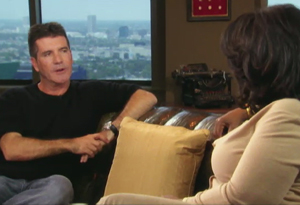
Another of Simon's favorite auditions was Britain's Got Talent's Susan Boyle, he says. "I was in such a bad mood. I just didn't want to be there—bored, never thought we'd find anyone good—the second I saw her come out , I'm like 'Oh my god, here we go,'" he says. "And then she started to sing and I thought, 'My God, [I've] got this all wrong.' Then when I watched the clip back when it was all edited together and I saw the whole thing, I actually hated myself. I mean genuinely. I thought: 'You know what? We're all sneering. We're not listening to people. We're judging everybody.' I just didn't like what I saw. It was a wake-up call, and I was happy that she made us look stupid. Genuinely happy, because we deserved it."
So how is X Factor different from all the other talent shows Simon has judged? "First of all, there's no upper age limit. I like the idea that somebody who could be 60 years old can enter the show. There's a lower age limit—we're taking it down to 14—and singing groups can enter the show. So when we created the show in the first place, we kind of saw in our mind almost like a David versus Goliath potential final where a 16-year-old could be competing against a 35-year-old," he says. "I have genuinely no idea whether it's going to work or not, but I'll put its success or failure down to the fact, can we or can we not find a star? And I'm confident we can find a star."
So how is X Factor different from all the other talent shows Simon has judged? "First of all, there's no upper age limit. I like the idea that somebody who could be 60 years old can enter the show. There's a lower age limit—we're taking it down to 14—and singing groups can enter the show. So when we created the show in the first place, we kind of saw in our mind almost like a David versus Goliath potential final where a 16-year-old could be competing against a 35-year-old," he says. "I have genuinely no idea whether it's going to work or not, but I'll put its success or failure down to the fact, can we or can we not find a star? And I'm confident we can find a star."



